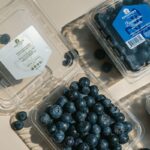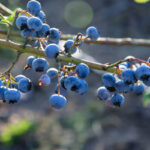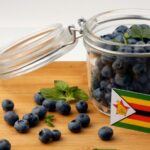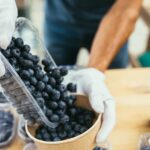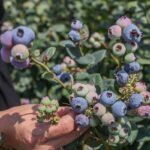Peruvian blueberries project positive season, with good prices and quality

Luis Miguel Vegas, the general manager of the Association of Blueberry Producers and Exporters of Peru (ProArándanos), participated in a webinar hosted by Fluctuante titled "The Analysis and Challenges of the Peruvian Blueberry Export Campaign 2023/24.
At the start of his presentation, he offered a broad overview, noting that Peru's fresh blueberry exports have increased over the past decade. "We are world champions in blueberry exports, which is a point of pride given our highly professional industry and the favorable climate that enhances our blueberry production," Vegas said.
He explained that last season lacked a typical winter, leading directly from spring to fall. "After years of steady growth, we saw a drop in production last year, declining from 286,000 tons to 224,000 tons," he stated.
He emphasized that this was the first time production had fallen due to weather conditions—specifically higher-than-normal temperatures and radiation—which adversely affected the plants, particularly some varieties like Ventura, leading to decreased production.
Vega noted that the FOB value of blueberries had risen by almost 30%. "Last year's deficit in supply expectations led to a price rebound, underscoring the growing global demand for blueberries," he explained.
Regarding producing organic blueberries, he reported that 10% of the total exported fruit corresponds to this category. "We also had a drop in organic blueberries."
The presentation also had space to analyze the destination markets for the fruit. In this regard, the ProArándanos executive expressed that the main market is the United States.
"Last season, almost 56% of the total volume was shipped to the United States. Europe was the second-largest market, accounting for 30%, with the Netherlands alone making up about 20%," he said.
He added that next is China, where last season organic blueberries accounted for 12%, while the remaining 5% is distributed among more than 20 countries including South America, Central America, the Middle East, and Southeast Asia.
Shipments
Luis Miguel Vega noted that blueberry production and exports primarily occur in September, October, and November.
"Historically, September and October account for about 50% of the annual shipment volume," Vega explained. "At ProArándanos, we track the campaigns from May to April the following year, as blueberries in Peru are harvested and exported weekly throughout the year, though not uniformly."
He explained that early in the season, from May to August, the Chinese market plays a significant role, leading exporters to prioritize shipments to China. However, from December through the following year, China's market share considerably decreases as the United States' increases.
Production
Another of the points presented in the webinar was the figures corresponding to blueberry plantations. "In 2016 we had less than 2,000 hectares planted, 90% was in La Libertad, and at the close of last year we see that the total hectares certified for export are over 18,000 hectares," said Vega.
He indicated that La Libertad is still the main region in terms of number of hectares, but its share dropped by half, at 45%, due to the growth of other regions such as Lambayeque and Ica.
Consumer
The Peruvian industry must also be attentive to consumer trends. Vega explained that every day people are more demanding, "this is also in line with a more attractive offer for the consumer, with new varieties, bigger, crunchier, with better flavor and better post-harvest life".
He added that consumers want to know more about what they are eating, where it comes from, and how it is produced, so the issue of sustainability is very important. Not only do we have to do it," he said, "but we have to communicate it.
Varieties
Luis Miguel Vega argued that Peru is in the process of varietal replacement: "We see that Biloxi in 2016 represented almost 60% of the plantations along with Ventura and currently no one here is planting those varieties. The trend is to start making a replacement with new varieties. It is already being done and we see that five years from now Biloxi and Ventura will surely fall considerably".
In his opinion, in the next few years, the industry will be 20% classic varieties and 80% will be new varieties, "because there is an important offer of new varieties and the blueberry market has become very dynamic in terms of varieties. I think it is in line with what happened with grapes, where they have well-positioned varieties in terms of branding".
2024-2025 campaign
The presentation also included an analysis of the current season. In this regard, the general manager of ProArándanos said that "last year we fell and this year we have started with a volume below last year and we are seeing a slow start of the campaign, due to the weather, which is now normalizing".
He added that flowers can be seen on the plants, so, even though the start-up has been slower, with lower volume at the beginning, "it is projected that production will come, but the start-up is slow".
Vega argued that among the factors that have affected the delay of the season, is the late pruning of the last campaign, "since normally they are made on average from December 15 to January 15. Last year, due to the El Niño phenomenon, the fruit was harvested very late, so many companies pruned later than usual".
Another factor, which is a trend that will be observed in the future, "is that the Peruvian industry is setiando (sic) to have a volume spread over more weeks of the year and not have such concentrated peaks as we had in September-October, where we had a week that almost 22,000 tons were shipped".
In this sense, he explained that the Peruvian industry tends to have lower peaks and distribute the volume among more weeks of the year, in order to deconcentrate the higher volume they have in October and spend more volume towards the end of the year.
Vega concluded by saying that "a very good season is coming, we hope with good prices. In terms of quality, we have very good fruit, but as always we cannot let our guard down".

















